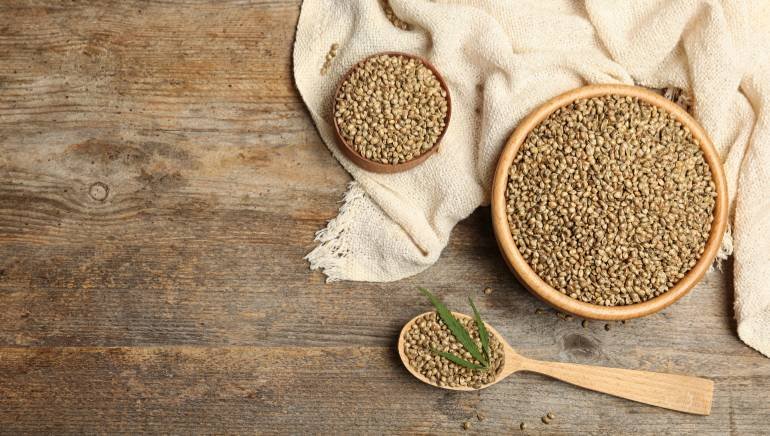Inside BENEO’s new pulse plant: pioneering sustainable protein from faba beans
Rohit Shah, CEO & Co-Founder, Hemp Horizons Pvt Ltd. Shares his views on hemp seeds market in India
The medical properties of cannabis are not a new-found discovery. The hemp plant has been cultivated for more than 12,000 years and, while it has great economic significance. In India, this plant’s unique properties were recognised thousands of years ago in the Atharva Veda.
The industrial hemp market is projected to surge at a CAGR of 34% from USD 4.6 billion in 2019 to USD 26.6 billion by 2025. Due to its various health benefits, the growth of this market is attributed to growing drastically. However, the complex regulatory structure of industrial hemp and its usage in different countries is expected to block the market growth of industrial hemp. Today increasing demand for hemp seeds over traditional herbal seeds is driving the growth of the market. The growing demand for personal care products, protein supplements, cosmetics and several other health products will boost the market in the forecast period.
Reasons why hemp is expected to dominate the market
Hemp fiber is majorly used in the textile and pulp & paper industry, due to its long and robust fibers as compared to cotton. Also, being a renewable source material, its application has been expanding in many diversified industries such as construction, animal bedding, automobile, agriculture, and furniture. Moreover, its usage to obtain biofuels and bioplastics has also been expected to increase its demand in the coming years. Also, hemp oil is projected to be the fastest-growing type, owing to its role in preventing conditions such as anxiety, depression, pain, and acne. Furthermore, the growing usage of hemp oil in personal care products, health supplements, and food & beverages are expected to drive the market for this type.
Hemp seeds obtained from the plant “Cannabis sativa” contain only trace amounts of tetrahydrocannabinol (THC). They are rich in two essential fatty acids, linoleic (omega-6) and linolenic (omega-3). They are also a rich source of vitamin E, vitamin B1, vitamin B2, vitamin B6, vitamin D, calcium, magnesium, and potassium, among others. Seeds of hemp are majorly used to produce oil which is consumed in food and beverages, animal feed industries and cosmetics. It is also used in nutritional supplements and medicinal and therapeutic products such as pharmaceuticals. Increasing consumer awareness about the benefits associated with these products is also taking the success ahead.
Growth of Hemp in India
India has a long-standing cultural affinity with cannabis due to its religious and sacred place in Indian society. According to World Drug Report, New Delhi is the third-largest consumer of Cannabis globally, where Mumbai is the sixth, even surpassing Los Angeles and London, respectively.
Being a tropical nation, India has a greater photoperiod which is favourable in hemp growth and its flowering as well. Based on the planting density fibre and seed yield can be varied, and the desired production can be enhanced with minimal efforts. One of the most interesting verticals of a hemp crop is its organic growth. This industrial hemp can be grown without the use of pesticides or herbicides. Not just this, the multipurpose hemp can also be used in crop rotation to eliminate pesticides effects, soil remediation, weeding fields, and bio-absorption of heavy metals and contaminants. Rising awareness among the Indian consumers about the benefits of industrial hemp and increasing legalization to cultivate industrial hemp in many parts of the country is expected to drive its market in India.
Dietary benefits
Hemp seeds are incredibly healthy, and they may be one of the few superfoods worthy of their reputation. So let’s look at the dietary benefits of the same.
Incredibly Nutritious
Hemp seeds are a great protein source, as more than 25% of their total calories are from high-quality protein. Hemp seeds are also a great source of vitamin E and minerals, which can be consumed raw, cooked, or roasted. It also contains GLA, which is harder to find and prevents inflammation and also helps to bind and balance the body’s hormones.
Better Heart Health
Interestingly, eating hemp seeds may reduce your risk of heart disease. It keeps cholesterol and blood sugar at healthy levels and improves blood circulation. These seeds are particularly rich in the amino acid arginine which plays a role in the body’s production of nitric oxide which causes the blood vessels to dilate and relax. Thus, in turn, it lowers blood pressure and reduces your risk for heart disease.
Aids digestion
Hemp seeds are packed with antioxidants like fiber which help the digestive system and boost daily energy. Fiber is an essential part of your diet and linked to better digestive health. Whole hemp seeds are a good source of both soluble and insoluble fiber, containing 20% and 80%, respectively leading to keep your digestion on track.
A Pain reliever
Hemp seeds offer great restorative properties that can alleviate joint pain, arthritis, and general aches. It contains constituents that work with the body’s own cell receptors to help reduce pain. Anecdotal evidence also shows that hemp seed oil makes a soothing and gently pain-relieving massage oil for rubbing into the muscles following a workout.
Food for the skin
Hemp seeds include more than 30 per cent fat, and they are particularly rich in alpha-linolenic acid (omega-3) and linoleic acid (omega-6). These oils are often used in cosmetics because they have the ability to penetrate through layers of skin to promote cell growth. These seeds can also help to repair and moisturize dry and damaged skin – they also support healthy hair and nails.

